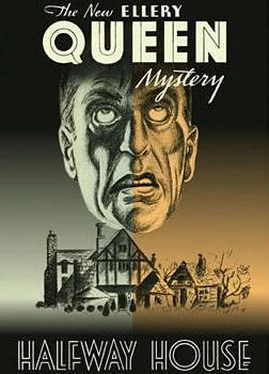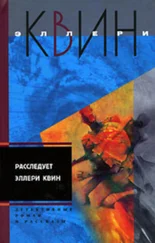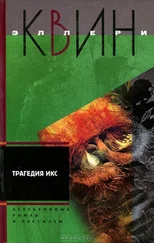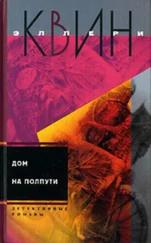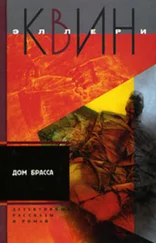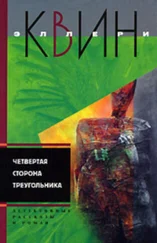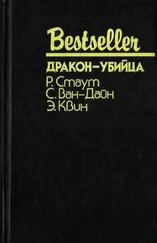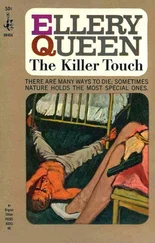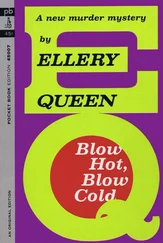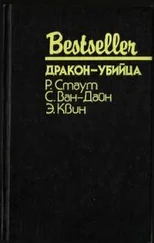“Not the least bit. Not what you would call trouble .” Andrea’s chin hardened a little. “When we got back I found a series of frantic messages from Burke’s mother. I suppose you don’t know Burke’s mother?”
Bill grunted, looking glum, and Ellery said dryly, “Haven’t had the pleasure. Is she horsy, too?”
“Worse than that. She has aviation on the brain, an acute case. Goes about flying, gets in everybody’s hair. The professionals are afraid of her. Gray bobbed hair, a nose like Cæsar’s, and the riches of Midas. Well, dear Mrs. Jones wanted to know what in heaven’s name had happened to her little Burkie boy.”
“Oh,” said Bill. He was scanning Andrea’s face with renewed anxiety.
“It seems,” murmured Andrea, “that he came home last night with a black eye, a smashed nose, and a front tooth missing. Burke’s very proud of his appearance, you know, and this will keep him out of circulation for some time.”
“Break for the horses,” muttered Bill. “Did you—?”
“And of course,” continued Andrea, “Mrs. Jones wanted to know why I broke off the engagement. Then Mother got in on it and we had a perfectly lovely time. I was afraid Mother would throw a fit right on my bedroom rug.”
“Did you—?” began Bill again.
“Well, no, I didn’t. I thought,” Andrea looked at the floor, “one shock at a time was sufficient. Later...” Her voice was low. Then it lifted and she smiled again. “I suppose you’re wondering why I’m here?”
“Sufficient unto the day is the fact thereof,” said Ellery gallantly.
“No, but really. I awoke this morning remembering something that I’d completely forgotten last night. It’s a small thing that can’t be important, but you said you wanted to know everything.”
“Andrea.” Ellery rose, then he sat down again. “About that night in the shack?”
“Yes. Something I saw before I was struck by that fiendish woman.”
“Something you saw?” Ellery’s gravity was smothered in a rising tide of excitement. “What, Andrea? Don’t worry about its unimportance; let me do the fretting. What was it?”
“The matches.” Andrea shrugged. “Those yellow paper-matches on the plate. You see, I told you it was trivial. But they were different.”
Bill jumped up and went to the window, as if a thought had suddenly struck him. Below, on Eighty-seventh Street, a black town-car shone opulently at the curb. A few yards behind was parked a nondescript sedan with a hard-faced individual smoking at the wheel. “Andrea! You shouldn’t have come. Have you gone out of your mind? I just realized. That town-car downstairs simply shrieks. If that woman gets wind of this—”
Andrea went pale. But Ellery said impatiently: “There’s no danger, Bill; don’t be an old woman. Come, come, Andrea! What about those matches? In what way were they different?”
Her eyes were wide on Bill. “There weren’t as many,” she said in subdued tones.
“Not as many?” snapped Ellery. “When?”
“When I was standing in front of the table just before she hit me on the head. I saw the plate clearly. Everything was perfectly clear, like a photograph. It must have been my nerves. My nerves were on edge and my brain was racing—”
Ellery was leaning on the table now, his knuckles white. “Before she struck you the plate held fewer matches than — when?”
“Than when I came to and found the note in my hand and the woman gone and Joe on the floor.”
Ellery pushed back from the table. “Now, look here, Andrea,” he said softly. “Let’s get this straight. You came in, advanced to the table, saw the plate, were hit on the head, and when you revived noticed that there were more matches on the plate than when you’d come in. Is that right? Now, how many more were there?” his voice became urgent. “Think hard, please. I want the exact number .”
Andrea was bewildered. “But what could it possibly—”
“Andrea, will you answer my question!”
She frowned dutifully. “I don’t remember how many more there were when I revived. All I recall is how many there were on the plate when I came into the shack.”
“That will do.”
“There were six; I’m sure of the number. Six matches on the plate. I think subconsciously I counted them.”
“Six. Six.” Ellery began to pace up and down between Andrea and Bill. “Burnt, eh?”
“Oh, yes. Or rather half-burnt. You know.”
“Yes. Six matches which had been struck and used.” Ellery compressed his lips and continued to pace, his eyes abstracted.
“But, Ellery,” said Bill wearily, “what difference can it make how many she saw?”
Ellery made an impatient gesture. Andrea and Bill looked at each other, first in perplexity and then, as Ellery flung himself into a chair and began telling something off on his fingers, with a half-glimpsed excitement. Then he stopped counting, his features perfectly at rest. “Andrea, what was the situation as regards that plate when you first looked into the shack?”
“You mean at eight o’clock?”
“Yes.”
“Why, the plate was empty.”
“ Wunderlich! Andrea, this is vital news. Are you sure you haven’t left anything out? There’s one thing — if only...” He stopped again to remove his pince-nez and tap them against his lips.
Andrea looked blank. “Why, I don’t think so. I think that’s all.”
“Please, Andrea. Concentrate. The table. Try to visualize the table as you saw it. What was on it at eight o’clock?”
“The empty plate. The lamp, unlit. I lit it then, as I think I told you. That’s all.”
“And at eight thirty-five, when you walked in — that is, just before you were assaulted?”
“The lamp, the plate with the six half-burnt match-stubs, and — oh!”
“Oh,” said Ellery. “We’ve struck a mnemonic chord.”
She said breathlessly, “There was something else; I remember it all now. There was a match-packet on the plate, too! Closed!”
“Ah,” said Ellery, and he put the pince-nez back on his nose. “An interesting point.” The way he said it, the way his eyes behind the rimless lenses glittered, made Bill glance at him sharply. “This packet of matches, Andrea — do you remember anything about it?”
“Why, no. Just that it was closed. It was a packet of paper-matches. You know. Those little things where the top fits into the piece where you strike the match—”
“Yes, yes. That’s everything, Andrea? You’re sure?”
“Really, I don’t see... That’s all.”
His eyes flickered. “Well, that takes care of the period before your assault. Now what was on the table when you came to?”
“The plate with a great number of those burnt yellow match-stubs — you saw them yourself later that night — the lamp, and that horrible paper-cutter with the — the — blood and burnt cork on its tip.”
“Nothing else?”
She thought for a moment. “No. Not a thing.”
“Wasn’t the match-packet still there?”
“No.”
“Hmm.” Ellery studied her for a moment rather queerly. Then he heaved himself out of his chair and said to Bill, “How would you like the job of sticking close to Andrea for a few days? I’ve changed my mind. I agree there may be some danger now — more than last night.”
“I told you there would be!” raged Bill, waving his arms. “Andrea, that was childish — coming here so openly. What do you think I ought to do, Ellery?”
“Take Andrea home. And stay there. Be her shadow. That shouldn’t be a specially onerous assignment.”
“You really think—?” began Andrea faintly.
“It’s safer, Andrea. Well, well, Bill, don’t stand there like one of Madame Tussaud’s exhibits!” Bill dashed off to the bedroom. He was back in an impossibly short time, fully dressed and flushed to the tips of his ears.
Читать дальше
